Elder Scrolls Online Expands In A Big Way With Morrowind
Return to Vvardenfell.
This June, Elder Scrolls Online will expand to a land that will feel alien in the context of Bethesda's MMO but certainly familiar to any longtime Elder Scrolls fan. Morrowind makes its return, although this new chapter for ESO takes place 700 years before the events of the classic 2002 offline game. It's a promising clashing of worlds, where the characters conceived for ESO meet the ancestors (or even younger versions) of familiar Vvardenfell inhabitants. We spoke with ESO game director Matt Firor and creative director Rich Lambert to learn more about making Morrowind a connected online experience.
Gamespot: Why Morrowind as opposed to any of the other Elder Scrolls locales?
Rich Lambert: There are two big reasons. One is it's a beloved place that started off a lot of people on Elder Scrolls and the other one is it's not traditional fantasy. It's aliens, it's giant mushrooms, and alien bugs.
Matt Firor: I think it's a logical progression if you look at our DLC. After console launch, we did Orsinium which was off the beaten path. It hadn't been in an Elder Scrolls game in forever. The two after that were the Thieves Guild and Dark Brotherhood, which were hallmark Elder Scrolls experiences. Those took place in a part of the world where Oblivion took place also.
The reaction to going back and walking around the town when people played Oblivion in Cyrodiil was so great that we're like, "Okay, we want a nostalgic moment like that." There's nothing more nostalgic than going back to Vvardenfell which is where the whole series really took off, so that's why we picked it. It's a part of the world with a different feel and it's inside the same game.
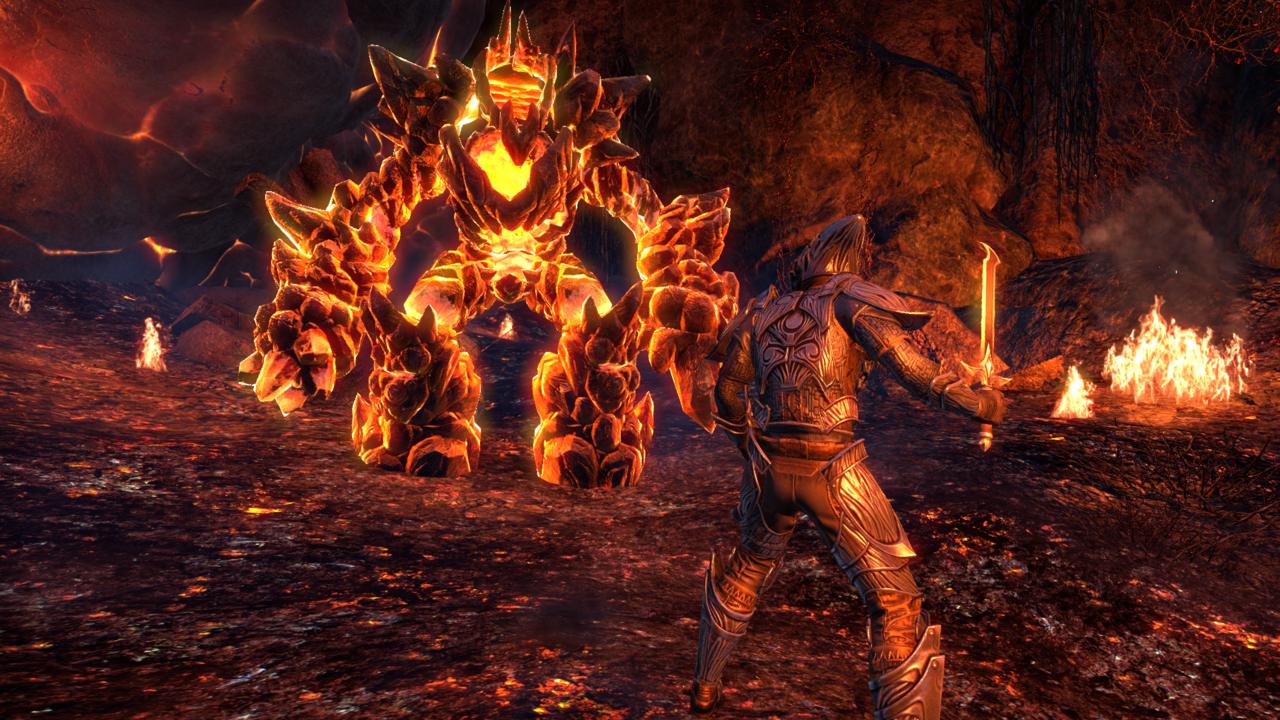
We imagine the setting and the space of 700 years in between the single player game and ESO was both liberating and intimidating.
Matt: It's interesting because the Dunmer dark elves that live in Vvardenfell actually can live to be over 700 years. It is possible that we can run into a character that was in both timelines and there are a few. 700 years is geologically not so long. The land looks the same, but it's far enough away that you can have your own characters and your own stories without running too hard into what happens later. We just have to know what happens later so we don't box ourselves in.
Was there ever a consideration for setting ESO Morrowind during a different period in time?
Rich: Yes, we could've done that, but it made more sense to have character continuity with our original game so you could have characters that lead you into it and the stories could all be on the same timeline. It was just much easier. We never seriously thought about that, but we actually did think about it a little bit.
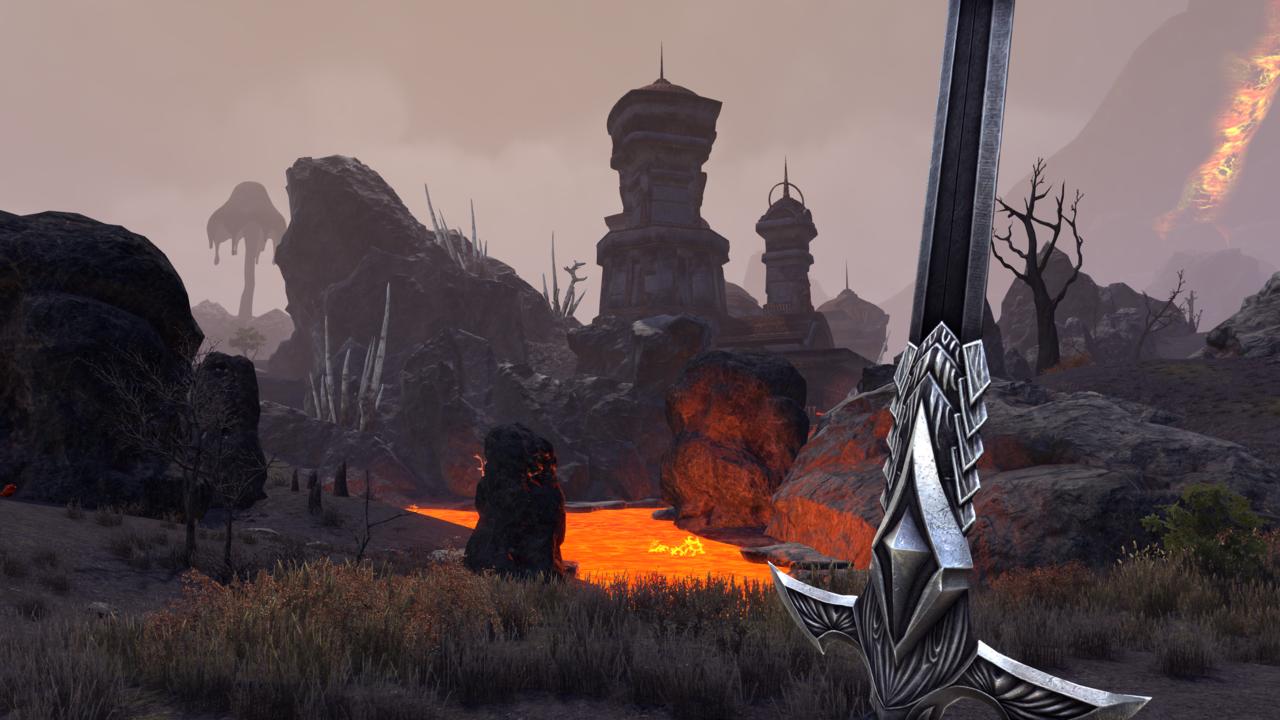
How important is it for you personally to keep the lore consistent?
Rich: It's huge. The second we step out of line, our lorehounds just hammer us. If it makes it past all the internal ones and gets to the fans, they really let us have it. We have to be really careful about the places we go, the things we explore to make sure they fit with the new lore.
Matt: Elder Scrolls is a very established, 20 plus year-old IP. You need to make sure that you're consistent. There was Arena, Daggerfall, Morrowind, Skyrim, Oblivion, and a bunch of other little games in between there and we need to make sure that we're consistent with the lore for all of them.
Thinking more about lore, I imagine it's a challenge when you decide to bring a beloved character from the base game to Morrowind, as you're planning to do with Naryu Virian.
Rick: It's something that you always have to be really careful of. You have to remember her tone, her voice, and her mannerisms. Fortunately, Naryu is a character that we made up, so it was easier. It gets a little trickier when you look at characters that were in some of the original games, like Divayth Fyr. He makes an appearance in Morrowind. So we have to be very careful how to portray him. How do we make sure that you understand that it's not a doppelganger? This was him when he was younger and probably a little less wise.
I assume you're in no rush or have any ambitions convert content from ESO into a standalone offline game like Skyrim, Morrowind, or Oblivion?
Rich: No. We want to look out for us. Bethesda Game Studios is their own separate thing. We interface with them a lot to make sure that we're not going out of bounds, but the things we do have no impact on the things they do or could do in the future.
Matt: That's something we've obviously thought about, but our game is so intrinsically tied to the server that it's just beyond our technical capability right now.
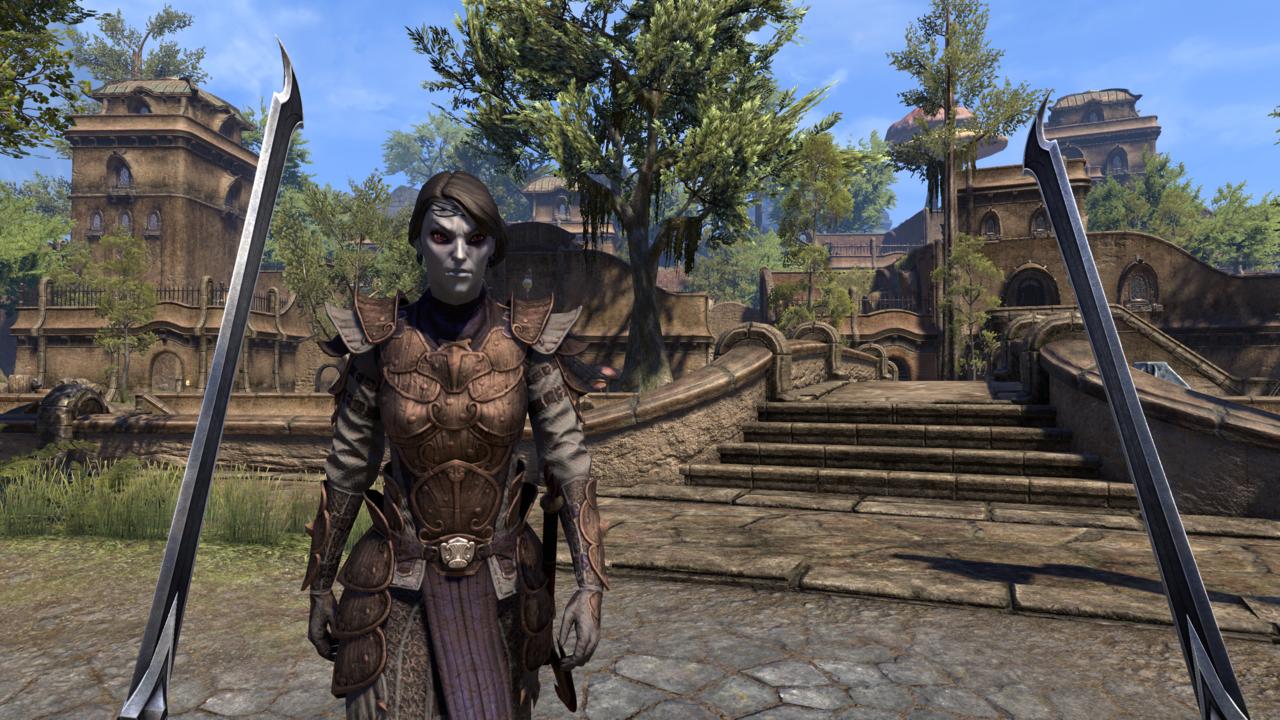
What are some of your personal lessons from having had the time to look back at the original version of ESO?
Matt: I should do a GDC lecture on this. Basically what happened was we launched on PC and it didn't go as well as we wanted. Yeah, we sold a lot of units. The feedback was, "This isn't the Elder Scrolls game that we wanted," essentially. Our review ratings were all over the board. 50 to 90.
Yet, we had this one thing that we noticed and that is that even though there were lots of complaints, we had a pretty substantial group of people that log in and played the game everyday for six months. We knew we had something and our job as designers was to figure out what we're doing right with those people and do more of that and do less of the stuff that people don't like. You'll learn very quickly when you're in the game design business, especially in a service type game, that what people are complaining about is not always the things that they're reacting to.
You need to actually combine their feedback with actual in-game metrics and figure out what they're actually doing and if that's the same as what they're complaining about. What that led us to was the sense of the game did not feel enough like an Elder Scrolls game. It felt too much like a circa 2004 MMO. That's where it started.
Rich: The biggest lesson for me is that choice is cool, but not at the expense of player separation. One of the things we learned very quickly at launch was, "Yeah, choice is really awesome. It's cool that I can pick this particular house and get locked in this house and go do this thing, but if my buddy chooses the other house, we can't play together in this area because the choices are cut and dry. I can go here or I can't go there." And so we spent the first 6 months of the game undoing a lot of those choices so that they weren't the ones that locked you out of areas and didn't separate you from your friends.
Choice is really hard to do. Not only because you have to worry about separation, but in order for a choice to matter, you need to understand the motivations behind the characters and so you have to have interactions with them and understand them. The best choices are not black and white, "Well, this guy is an asshole. Obviously, he needs to die." The best choices are "Well, I feel really dirty making either of these choices," which is the lesser of two evils thing. Those are the ones I love the most.
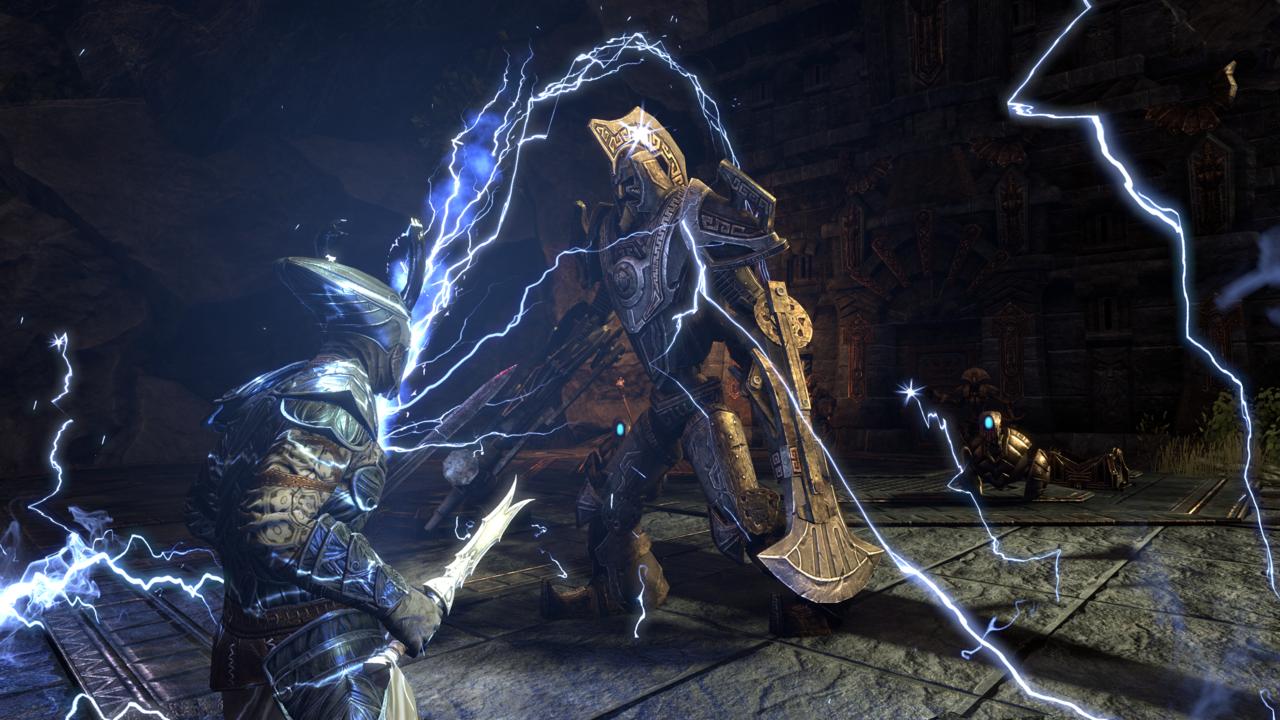
We imagine you guys could've only brought so much influence and design lessons from previous MMOs.
Rich: When you look at our 2014 launch, ESO was like a hybrid MMO. It had your traditional MMO, which had a level grind, hard gated level zones, and the linear story path. It was also an Elder Scrolls game which was a little bit less linear, play the way you want to play experience. And we didn't really hit our identity until we decided that it needed to be a good Elder Scrolls game. That's when we started introducing Justice, which gave you some of the simulation type experience. That's what Elder Scrolls is. It's a living breathing world in a simulation and you get to mess with the simulation.
Were you anxious about finding that identity?
Rich: I definitely think that early on, we were a little bit gun shy in really saying what we wanted and what we wanted the game to be because we wanted to appeal to everybody, and therefore didn't hit all the notes that we wanted to. Now that we've got One Tamriel out, it feels like an Elder Scrolls world. You can go anywhere, you can play any way. It fits the combat system where any class can wear any armor set, can use any weapon set, and can mix and match abilities. It just feels like the game we originally envisioned back in 2007 when we first started talking about the game.
We'd like to think the fans who stuck to it in the beginning had more interest and investment than just the fact that it had the Elder Scrolls name on it.
Matt: Oh, yeah and that's why we looked at what they were doing. What game systems are they into? Those are the people that were very much into crafting and selling items to people, which we wanted. It's like, "Why aren't there more people crafting?" Then we'd look at the metrics and our entry into crafting was so complicated. It just drove people away before they could hit the part that was really cool, so we redid all our crafting tutorials and made it much easier to get into crafting. It's just one example of a million things that we did over that time to make sure that we hit that note.
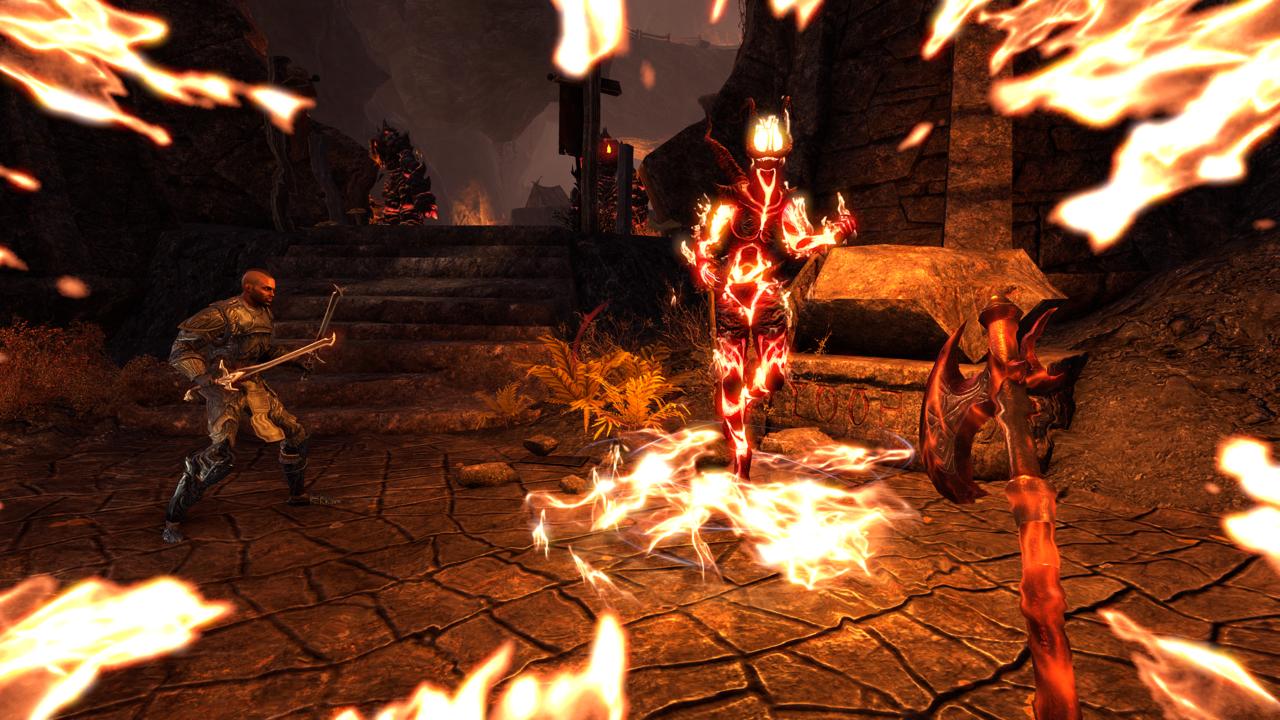
No matter how much you guys learned from the original iteration or the first couple versions, there was never a consideration of doing a major reset like Final Fantasy XIV: A Realm Reborn, right?
Matt: No, we never were at that level. This was more of a disappointment in how long people played the game. A lot of people bought the game, but they kept dropping out of it quickly, except for this hardcore group of people. We were very happy we captured those people and were retaining them. We never had to go the reset route. We were always generating money, so that was fine. It was much more about the next big event for this game which was the console launch. We made sure we fixed these things before we put millions of new players into the game. That was a reset in many ways, but it was a reset that didn't involve us waiving players and so forth.
You guys have been prolific since launch. We see parallels with the output EverQuest used to have.
Matt: Yeah, every 12 weeks we had an update, which was this crazy cadence. We had a lot of problems to fix and a lot of new things to add. Since console launch, we added paid DLCs, which added a new element to the game. Then we did One Tamriel. We were sprinting all the way from PC launch up through One Tamriel. Now with Morrowind, we're getting into what you would call the EverQuest expansion. Morrowind is our first new product that we have done since ESO launched.
Do you see ESO Morrowind as its own expandable platform?
Matt: ESO is always the core and then the chapters will just come around it. If you buy Morrowind, you'll get all the stuff in Morrowind, but we're never going to add more stuff to Morrowind. We'll just add more stuff to ESO.
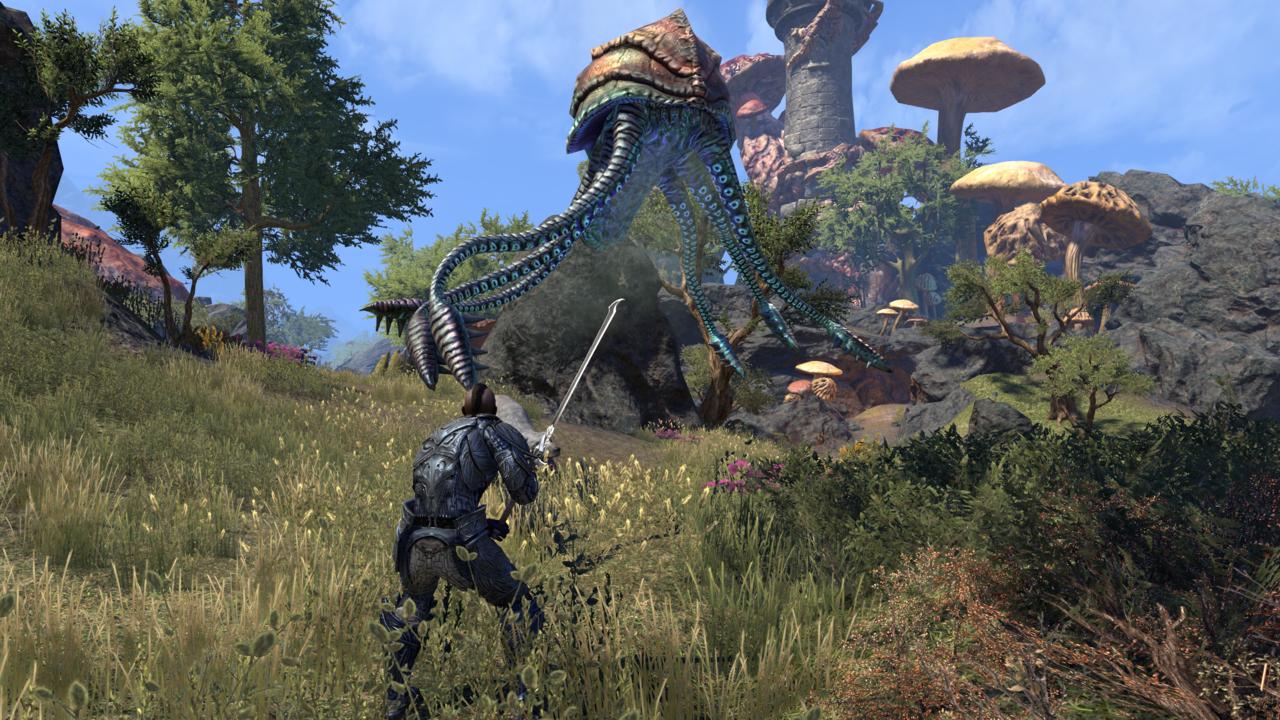
What are your thoughts on the specific audience that gravitates toward ESO's style of PvP which will extend to Morrowind?
Rich: You actually see them in Cyrodiil now. There are a subset of players in Cyrodiil that get their three or four buddies, they go off and stay away from the large keeps, take resources and look for ways to pull people away from the big battles and pick them off. The other thing that we get a lot of is, "It's really hard to find battles in Cyrodiil. I don't have 2 hours to participate in this large keep scene. I just want to jump in and play. Maybe I'm on my lunch hour. I want to get a couple of matches in." Well, that appeals to that group as well. You just jump in, queue up, get in, do your match, 15 minutes, and you're done.
Matt: If you want a 15 minute PVP experience where you're guaranteed to have a beginning and an end, that's what it's for. If you just want to concentrate on small group combat and not worry about 50 enemies running over the hill and steamrolling you, that's what open world is. Some players want a much more structured, almost sport-based PVP experience, so that's what it is.
For someone who's gonna jump into ESO through the Morrowind chapter, when they're, say, an hour in, there's nothing that's going to confuse them to think that, "Should I go to the base game first?"
Rich: Nope. Nothing like that. We don't actively vector you out of the zone until you complete the main story in ESO Morrowind. Now you can choose to leave at any point and you can just get on a boat or travel to one of the base game zones, but we don't actively vector you out.
Have you ever said to some of your coworkers, "We're adding too many easter eggs?"
Matt: No, because....easter eggs might be the wrong term. It's the only term we have for that right now, but it's much more of a sentimental note. I see this character but I don't have to know that he's the father of the character I ran into in Elder Scrolls 3, but if I do, it's more special to me. This is more than an easter egg. If I have a deep understanding of the world and I run into something, I will appreciate it more if I know that it ties me to Elder Scrolls 3. If you don't know it, it's still a cool game.
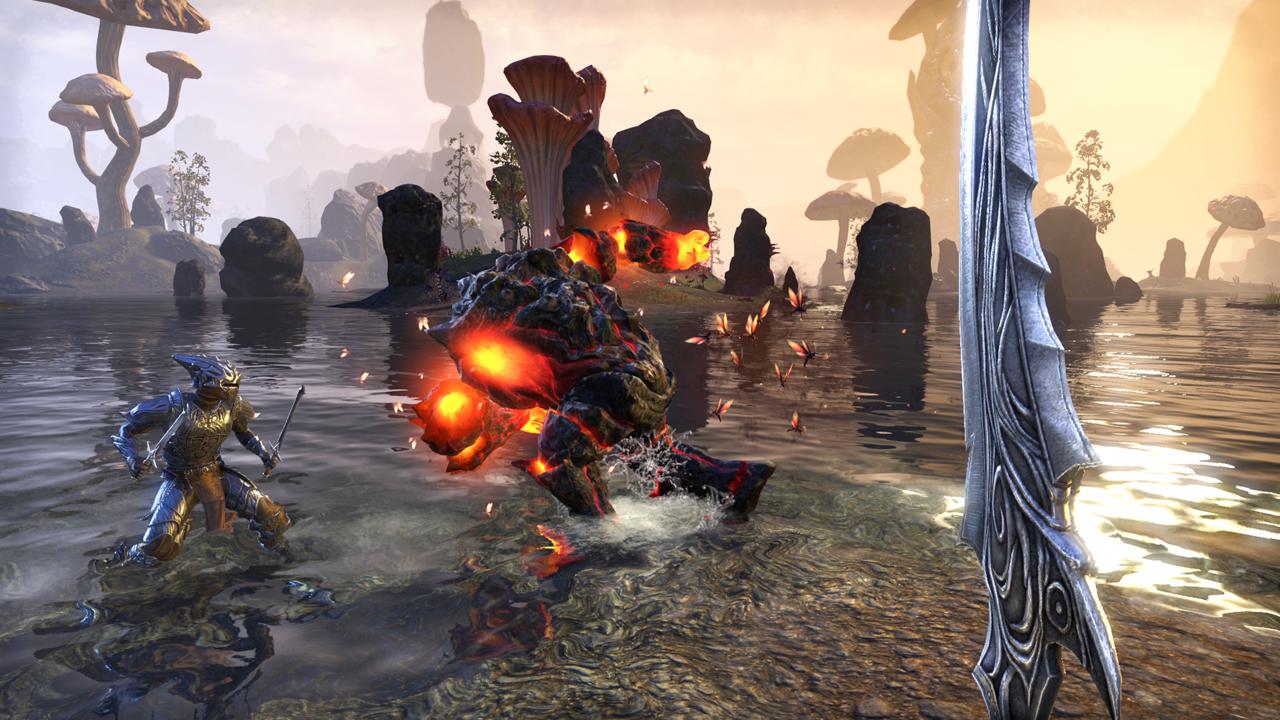
Got a news tip or want to contact us directly? Email news@gamespot.com
Join the conversation